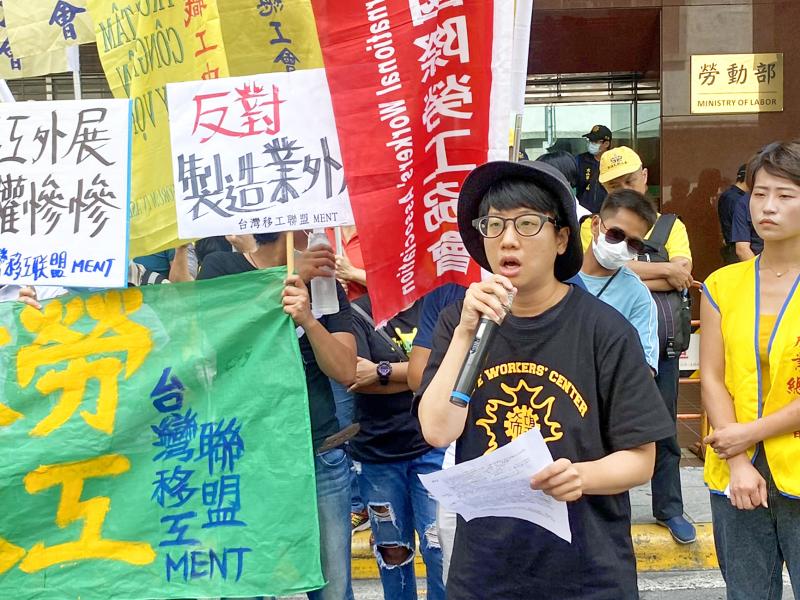Migrant rights groups rallied in Taipei on Monday to protest a government decision that would allow the use of migrant workers as temporary workers at the Changhua Coastal Industrial Park (彰化濱海工業區) to ease labor shortages, citing occupational safety concerns.
The Ministry of Labor (MOL) has approved a proposal by the Ministry of Economic Affairs to import migrant workers to serve as temporary workers at the industrial park, according to the minutes of an MOL meeting on Feb. 25.
The workers would be managed by a third-party nonprofit group and “dispatched” to factories in the park during peak production season or when they have to fill urgent orders.

Photo: CNA
A total of 50 migrant workers would be allowed into Taiwan for this purpose, the MOL said.
However, the Migrants Empowerment Network in Taiwan, a coalition of about 10 migrant rights groups, objected to the idea, chanting slogans and holding banners at a rally outside the MOL to voice its opposition.
MOL data show that many factories in the industrial park follow strict production procedures because they handle toxic gases or organic solvents, Weng Chien-wen (翁倩文) of the Hope Workers’ Center said.
However, using temporary workers would increase the risk of occupational disasters because they lack experience, and would need to adapt to a new and dangerous labor environment every three to six months, Weng said.
Normally, migrant workers in Taiwan, whether working in a household or factory setting, work for one employer or company under the same or similar working conditions for the duration of their contract.
Labor shortages are a longstanding problem because of long working hours and low pay, unstable work days, and dangerous working environments that increase the risk of occupational accidents, the groups said.
Rather than allowing factories to profit from cheap labor, the government should focus on improving labor conditions to bolster full-time employment, they said.
The MOL said that domestic laws and regulations, such as the Labor Standards Act (勞動基準法), the Occupational Safety and Health Act (職業安全衛生法) and the Act of Gender Equality in Employment (性別工作平等法), would apply to the 50 migrant workers who would have three-year contracts with the nonprofit organizations that dispatch them.
Nonprofit groups that import workers will be responsible for the workers, including taking out health and labor insurance on their behalf, the MOL said.
MOL data showed that as of the end of May, there were 707,308 migrant workers in the nation, including 274,269 from Indonesia, 219,716 from Vietnam, 156,014 from the Philippines and 57,843 from Thailand.

An essay competition jointly organized by a local writing society and a publisher affiliated with the Chinese Communist Party (CCP) might have contravened the Act Governing Relations Between the People of the Taiwan Area and the Mainland Area (臺灣地區與大陸地區人民關係條例), the Mainland Affairs Council (MAC) said on Thursday. “In this case, the partner organization is clearly an agency under the CCP’s Fujian Provincial Committee,” MAC Deputy Minister and spokesperson Liang Wen-chieh (梁文傑) said at a news briefing in Taipei. “It also involves bringing Taiwanese students to China with all-expenses-paid arrangements to attend award ceremonies and camps,” Liang said. Those two “characteristics” are typically sufficient

A magnitude 5.9 earthquake that struck about 33km off the coast of Hualien City was the "main shock" in a series of quakes in the area, with aftershocks expected over the next three days, the Central Weather Administration (CWA) said yesterday. Prior to the magnitude 5.9 quake shaking most of Taiwan at 6:53pm yesterday, six other earthquakes stronger than a magnitude of 4, starting with a magnitude 5.5 quake at 6:09pm, occurred in the area. CWA Seismological Center Director Wu Chien-fu (吳健富) confirmed that the quakes were all part of the same series and that the magnitude 5.5 temblor was

The brilliant blue waters, thick foliage and bucolic atmosphere on this seemingly idyllic archipelago deep in the Pacific Ocean belie the key role it now plays in a titanic geopolitical struggle. Palau is again on the front line as China, and the US and its allies prepare their forces in an intensifying contest for control over the Asia-Pacific region. The democratic nation of just 17,000 people hosts US-controlled airstrips and soon-to-be-completed radar installations that the US military describes as “critical” to monitoring vast swathes of water and airspace. It is also a key piece of the second island chain, a string of

The Central Weather Administration has issued a heat alert for southeastern Taiwan, warning of temperatures as high as 36°C today, while alerting some coastal areas of strong winds later in the day. Kaohsiung’s Neimen District (內門) and Pingtung County’s Neipu Township (內埔) are under an orange heat alert, which warns of temperatures as high as 36°C for three consecutive days, the CWA said, citing southwest winds. The heat would also extend to Tainan’s Nansi (楠西) and Yujing (玉井) districts, as well as Pingtung’s Gaoshu (高樹), Yanpu (鹽埔) and Majia (瑪家) townships, it said, forecasting highs of up to 36°C in those areas